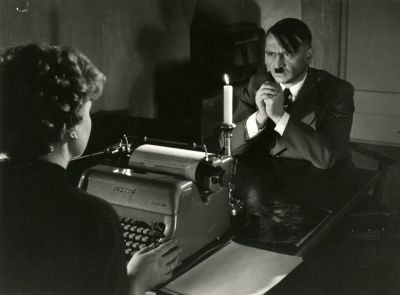
DER LETZTE AKT
(L'ultimo atto/The Last Ten Days, Austria/1955)
R.: Georg W. Pabst. D.: 113'. V. tedesca
T. it.: L'ultimo atto. T. int.: The Last Ten Days. Scen: Fritz Habeck. F.: Günther Anders. M.: Herbert Taschner. Mus.: Erwin Halletz. Int.: Albin Skoda (Adolf Hitler), Oskar Werner (Hauptmann Wüst), Erik Frey (generale Burgdorf), Herbert Herbe (generale Krebs), Kurt Eilers (Martin Bormann), Hannes Schiel (tenente colonnello SS Günsche), Willy Krause (Joseph Goebbels), Otto Schmöle (colonnello generale Jodl), Hermann Erhardt (Hermann Göring). Leopold Hainisch (feldmaresciallo Keitel). Prod.: Carl Szokoll per Cosmopol-Film GmbH
35mm. Bn. D.: 113'. Versione tedesca / German version
Da: Filmarchiv Austria
Introduce Olaf Möller
All'origine di Der letzte Akt c'era un libro scritto da un giudice del tribunale militare di Norimberga, Michael Musmanno, il quale aveva raccolto un'estesa documentazione sugli ultimi giorni di Hitler. La stesura della sceneggiatura fu affidata a Erich Maria Remarque. Ovviamente il film fu molto controverso: i conservatori vi videro un tentativo di lucrare sui sentimenti anti-tedeschi, la sinistra temeva possibili nostalgie naziste.
Der letzte Akt, insieme all'altro film di Pabst Accadde il 20 luglio, prestava il fianco alle accuse e aveva in comune con altri film della Germania Ovest la discutibile tendenza a fare di Hitler e della sua cerchia gli unici responsabili di tutto. Questi film descrivevano nei dettagli il crescente degrado psicologico e la condotta incostante di poche menti criminali, senza le quali non sarebbe successo niente di così catastrofico perché la maggioranza dei tedeschi erano brave persone. Il protagonista standard di questi film era il 'buon tedesco', qui interpretato da Oskar Werner.
Pabst riesce a creare un'atmosfera claustrofobica (lo spazio opprimente del bunker, la sua strana illuminazione, i soffitti bassi, la danza delle ombre sulle pareti) con il repertorio stilistico che lo ha reso famoso. Il risultato è un film psicologico ma anche una visione apocalittica del crollo di un'élite, con forti sfumature ironiche.
Marc Silberman ha scritto che il progetto originale "avrebbe dovuto trasformare Hitler in un eroe tragico elisabettiano che, monologo dopo monologo, sarebbe giunto infine a scontare la propria hýbris nell'ultimo atto eponimo. Un usurpatore come Riccardo III, un assassino come Macbeth ma senza rimorsi o sensi di colpa, questo è l'Hitler che con la sua tragedia produce la disintegrazione del mondo che lo circonda. Pabst, incapace di portare a compimento la dimensione tragica del suo materiale, si rifugia nel melodramma, che è una forma di tragedia riduttiva". Eppure molto rimane: questo è il miglior film realizzato da Pabst nel secondo dopoguerra insieme ai due titoli degli anni Quaranta, Il processo e Profondità misteriose.
Peter von Bagh
The development of The Last Ten Days started with a military judge at Nuremberg, Michael Musmanno, who wrote an outline based on extensive documentation. Erich Maria Remarque was ordered to write the script. Obviously the film went into the midst of political turmoil. Conservatives detected an effort to make money with an anti-German film, the left was worried that the film would provoke Nazi nostalgia.
The Last Ten Days, along with another contemporary Pabst film It Happened on July 20th, were targets for accusations, and because of this they shared with several West German films the dubious tendency to make Hitler and his loyal cohorts responsible for everything. Films might describe growing mental deterioration and erratic behavior in detail, and then suggest that without these few criminal minds nothing too bad would have happened, that the majority of Germans were decent people, and that a standard character, the 'good German', here played by Oskar Werner, fits that picture.
Pabst managed to create a claustrophobic atmosphere (the oppressive space of the bunker, its strange lighting and low ceilings, shadows dancing on the walls) with the stylistic repertory that had made him famous years before. It's a psychological picture as well as an apocalyptic vision of political leadership in collapse, with strongly ironic undertones.
Marc Silberman wrote about the original plan that would have "projected Hitler as an Elizabethan tragic hero who, replete with stagey monologue, must pay the price for his hubris in the eponymous last act. A usurper of power like Richard III, a murderous Macbeth with no qualms or guilt, this is the Hitler whose tragedy brings about the disintegration of the world around him. Ultimately, however, Pabst is unable to realize the tragic dimension of his material and takes refuge in melodrama, a form of reductive tragedy". Yet, much remains: this is Pabst's best post-WWII film, along with two 1940s films, The Trial and Mysterious Shadows.
Peter von Bagh
Precede
CONFERENCE - NOTES ON FILM 05
(Austria/2011) Film di Norbert Pfaffenbichler. D.: 8'
Tariffe:

Numero posti: 144
Aria condizionata
Accesso e servizi per disabili
Il nostro cinema aderisce al circuito CinemAmico: è possibile utilizzare l’applicazione MovieReading® per i film di cui è prevista audiodescrizione e/o sottotitolazione sull'applicazione.
Tel. 0512195311











